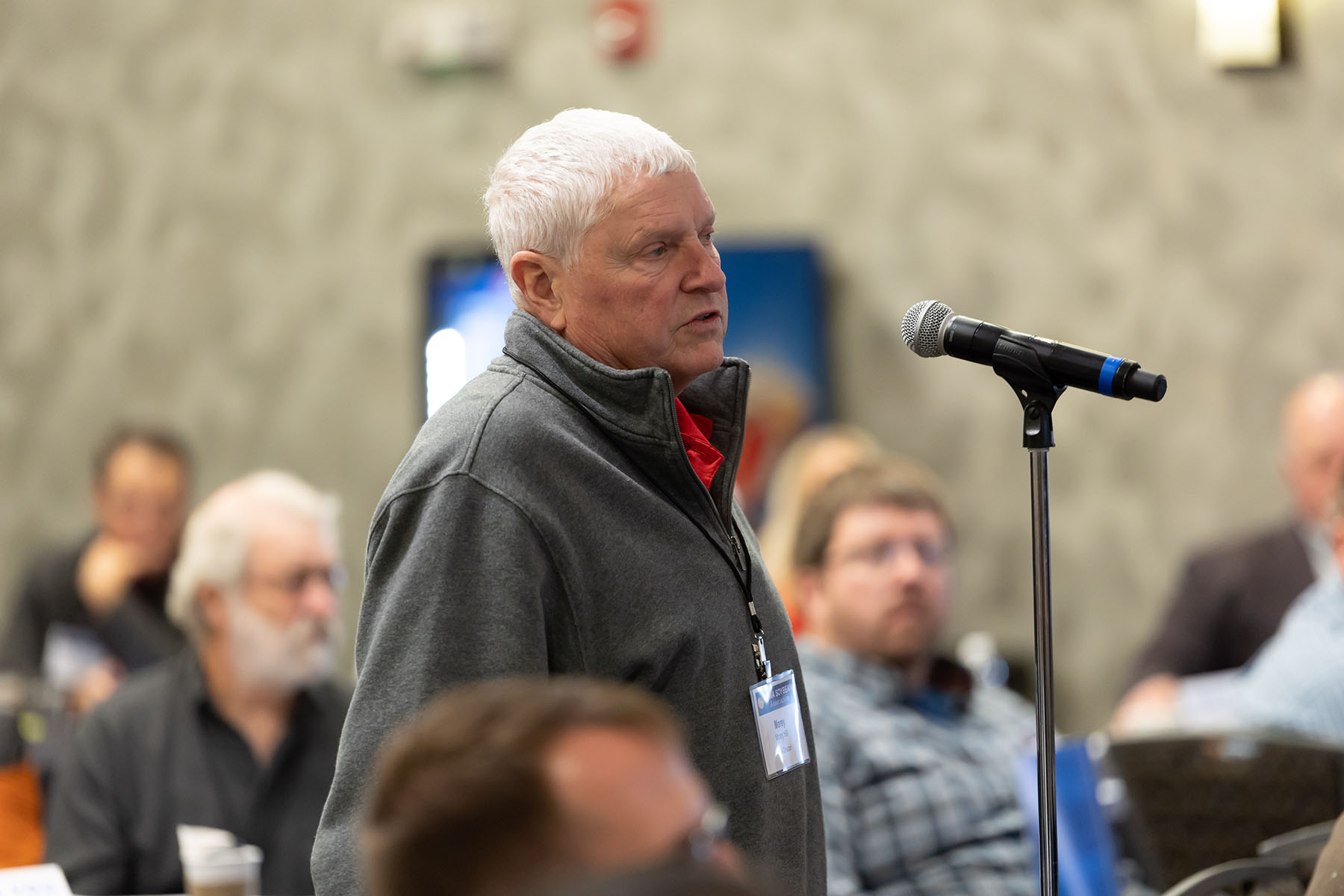
Iowa farmer Morey Hill speaks during a meeting. (File photo/Iowa Soybean Association)
Broad support for pesticide labeling bill
March 13, 2025 | Bethany Baratta
Glyphosate has been an effective herbicide on Morey Hill’s farm for decades. A commonly used ingredient in Roundup, the product helps defend his soybean and corn crops from weeds, allowing him to produce more crops near Madrid.
“It’s one of the tools that modern agriculture utilizes to protect our crops,” says Hill, a former Iowa Soybean Association (ISA) director.
But opponents to glyphosate contend that the pesticide ingredient causes cancer, and they’re fighting against a bill in the Iowa Legislature that aims to protect pesticide companies from claims that companies failed to warn that their product causes cancer.
In fact, leading health regulators around the world have repeatedly concluded that glyphosate products can be used safely, and the Environmental Protection Agency (EPA) found that glyphosate is “unlikely to be a human carcinogen.” Additionally, the EPA reviews and approves pesticide labels to ensure they meet the requirements of the Federal Insecticide, Fungicide, and Rodenticide Act (FIFRA), the federal statute that governs the registration, distribution, sale, and use of pesticides in the United States.
“My biggest concern is frivolous lawsuits from people who want to sue for what they think might have caused some of their problems because they might have been close to a glyphosate product,” Hill says. “It irritates me that people would be able to do that, and that’s what this law would stop.”
What it means
Legislation protecting against failure-to-warn claims have passed in Georgia. It passed in the North Dakota House of Representatives, and a vote in the North Dakota Senate is expected yet this week. Efforts are also underway in other states, including Iowa.
Seventy percent of North America’s Roundup supply is produced at a glyphosate production facility in Muscatine, which provides hundreds of jobs for Iowans.
Beyond employment, glyphosate allows farmers to implement conservation practices like cover crops, double-cropping, and reduced soil tillage.
And without glyphosate, a productivity regression is possible, Hill says.
“If we don’t have that, it’s going to make everything more expensive, including inputs and food,” he says. “We’d have to go back to more radical tillage practices instead of using the tools we have now, and it would make us go backward.”
This pesticide saves Iowa farmers an estimated $611.7 million annually compared to tradition tilling methods and other, pricier alternatives (including those sourced from China), according to the Modern Ag Alliance, a coalition of more than 90 agricultural stakeholders, including Iowa Soybean Association, which advocates for U.S. farmers’ access to crop protection tools.
In Iowa 73% of all soybean acres and 60% of all corn acres rely on the proven chemistry that glyphosate provides.
“It helps us cover more ground with less,” Hill says.
Broad acceptance
A
recent survey by Penta Group Intelligence, an independent research firm, concluded that Iowans strongly oppose litigation that could limit farmers’ access to critical crop protection tools. Of the respondents, 94% of farmers and 71% of all Iowans—including 74% Republicans and 76% of Democrats—oppose these efforts.
Lowering crop yields, leading to higher food prices for consumers during a time of record inflation was concerning to survey respondents, Penta asserted. Farmers (92%) and Iowans (73%) shared this concern.
“These findings send a clear message to Iowa lawmakers that their constituents stand with farmers, and they expect their elected officials to do the same,” says Modern Ag Alliance Executive Director Elizabeth Burns-Thompson. “The crisis facing U.S. agriculture can be prevented by ensuring safe and essential crop protection tools remain available. If our leaders don’t act, the consequences will be felt at every dinner table in America.”
Without glyphosate, food inflation could more than double. This would add up to $10 billion to the cost of food for households every year, according to Modern Ag Alliance. For fruits and vegetables alone, prices could increase 35% to 45%, on top of inflation.
Defending an important tool
Hill routinely updates his pesticide licensing through the Iowa Department of Ag and Land Stewardship (IDALS). His years of training, recertification and farming remind him that “the label is the law.” And that’s why, when opponents want to sue because of labels they claim are misleading, Hill shows up to the Iowa Capitol, in support of a bill that defends the pesticide that’s helped him continue his farm’s legacy into the third generation.
“People understand dollars and cents,” Hill says. “If we lose some of the technology that helps us farm in a more efficient and prosperous way, that’s going to make everybody’s food bill more expensive. We’re going through this egg crisis right now, can you imagine if flour or daily necessities go the same route? I want to parlay that support; farmers don’t need the litigation; we just want to farm and do the best we can.”
Back